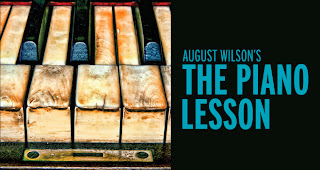As we read The Piano Lesson examine the text and try to answer the questions posed below (no need to write them, you will complete a character analysis due when we return from winter break--see below):
The Piano Lesson concerns the struggle of two siblings over a family heirloom: a piano carved with images of their African ancestors and crafted by their enslaved grandfather. The piano itself becomes a symbol. As you read, try to figure out what the piano means.
As writers, our settings often have significant meaning. They contribute to the theme of the play, as well as hold significance, complicate plot, develop character, and create conflict. In the Piano Lesson, the setting is the Great Depression.
This setting serves as the historical backdrop to the play as well as black migration during this period from south to north. Such migration increased steadily until stabilizing in the 1930s and creating new black communities that would be devastated by the economic ruin. Wilson was inspired by Romare Bearden's painting "the Piano Lesson," seeing in its scene of a teacher and student an allegory for how African Americans must learn to negotiate and learn about their history.
The Piano Lesson concerns the struggle of two siblings over a family heirloom: a piano carved with images of their African ancestors and crafted by their enslaved grandfather. The piano itself becomes a symbol. As you read, try to figure out what the piano means.
As writers, our settings often have significant meaning. They contribute to the theme of the play, as well as hold significance, complicate plot, develop character, and create conflict. In the Piano Lesson, the setting is the Great Depression.
This setting serves as the historical backdrop to the play as well as black migration during this period from south to north. Such migration increased steadily until stabilizing in the 1930s and creating new black communities that would be devastated by the economic ruin. Wilson was inspired by Romare Bearden's painting "the Piano Lesson," seeing in its scene of a teacher and student an allegory for how African Americans must learn to negotiate and learn about their history.
Romare Bearden's "The Piano Lesson"
Critic Sandra Shannon stated that Wilson formulated two thematic questions to address in his work: "What do you do with your legacy, and how do you best put it to use?" (The Dramatic Vision of August Wilson, 146).
Analysis & Questions to Examine While Reading
Plays are about characters foremost. Without interesting or compelling characters, there can be no good drama. Drama is also about conflict. So it's best to consider how a character reacts or creates conflict in a play. As we read The Piano Lesson, consider how each character deals with conflict when it arises, and how they also create conflict for the other characters in the play. Use your handouts to create a character relationship web.
It is important to pay close attention to character motivation in a play. One of the tips for good playwriting is to give your characters interesting motivations.
It is important to pay close attention to character motivation in a play. One of the tips for good playwriting is to give your characters interesting motivations.
But how do we do that?Motivation in plays is developed by characterization: what a character does (actions), what a character says, and what other characters say about another character. A character's motivation is often closely tied to the major conflict and theme of a play. Actors read scripts carefully looking for motivation for their characters. It is an essential skill for an actor. A playwright needs to help these actors out by making sure that each character has a purpose and a reason to act and say what he/she does.
Select two characters from the cast list. As you read, identify the motivation of each of your chosen characters. Be aware of how motivation creates complications, conflict, and characterization. Select from:
• DoakerActs usually end at a high point (or crisis: a crucial or decisive turning point or situation in a plot).
• Boy Willie
• Berniece
• Lymon
• Maretha
• Avery
• Wining Boy
• Grace
- How does Wilson end his first act?
- How does an essential question linger in the minds of the audience? i.e. what will bring the audience back from the intermission ready for more?
- What questions have been left unanswered?
- Can you find examples of a reversal of fortune in the second act. What clues were we given in Act I that suggests that this reversal was coming?
- What is your chosen characters' dark moment? A dark moment for a character is their lowest end--when things look their worst for that character.
- What is the character's enlightenment? An enlightenment is the sudden understanding of how to get up from the character's dark moment. How does your character's enlightenment lead to the climax?
- And then, finally, do you consider the ending pleasing, satisfactory, acceptable?
- How might you change the ending if you were writing the play?
You may watch the 1995 made for tv film: The Piano Lesson in its entirety.

